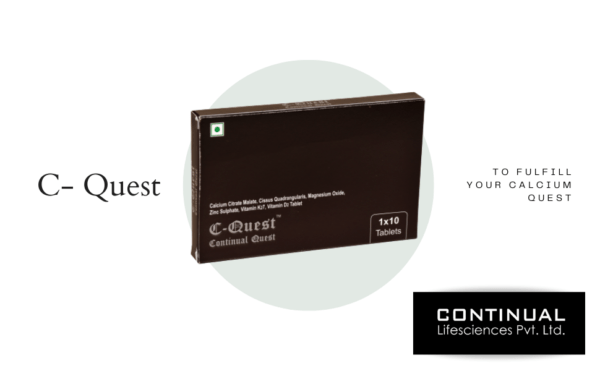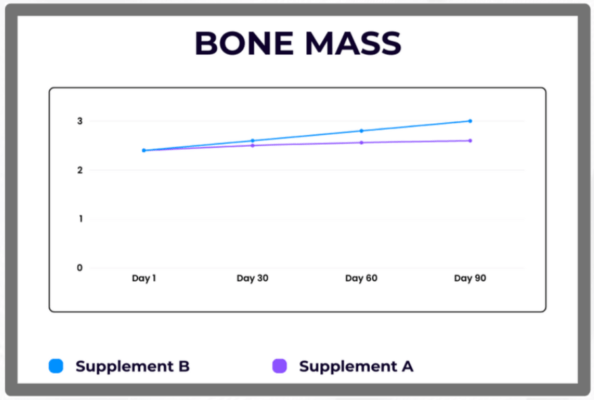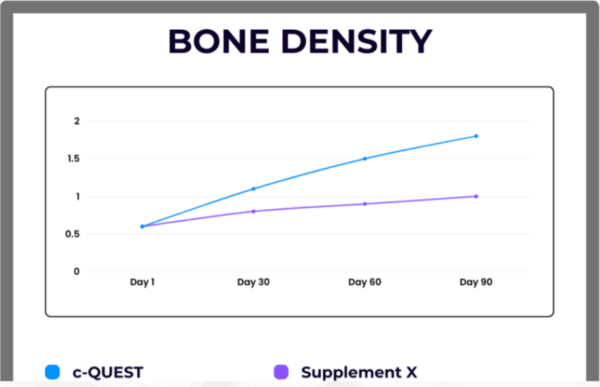
OBJECTIVES
Due to the arising symptoms of calcium deficiency lead to developing a formulation which is highly bioavailable,improves the bone density and reduces the calcium defieciency in the population.
Anlysing the effects of a calcium supplement which is formulated with Calcium citrate malate, Vitamin K27, Magnesium & Zinc along with an ayurvedic herb Cissus quadrangularis. which has a unique property to improve bone density.
METHODOLOGY
To analyze the effect of a calcium supplement on bone density via DEXA scan and to analyze the bone weight by body composition analyzer. Two groups of 60 patients were take into consideration and were ask to consume 2 different supplements of calcium. Supplement X had calcium carbonate as the main source of calcium whereas another one had calcium citrate as the major ingredients. This C_QUEST has Cissus quadrangularis as an ayurvedic herb.
RESULTS
BONE DENSITY
Supplement X after 30 days it was observed a total improvement of 0.2 % increase and at the end of 90 days i.e. 3months 0.2% increase.
C-Quest after 30 days it was observed a total improvement of 0.4% increase and at the end of 90 days i.e. 3months 1.8% increase.
BONE MASS
Supplement X after 30 days it was observed a total improvement of 200g increase and at the end of 90 days i.e. 3months 400g increased.
C-Quest after 30 days it was observed a total improvement of 200g increase and at the end of 90 days i.e. 3months 600g improvement and the symptoms reduced too.


CONCLUSION
C-Quest: Calcium citrate malate with K27 and Cissus quadrangularis is the most effective when it comes to improving bone density , bone mass and also reduces the chances of sub-chondrial fracture and even osteoporosis. It also reduces the symptoms and difficulties related to menopause.
AT A GLANCE
2 GROUP OF 60 EACH
Supplement X Calcium carbonate with Vitamin D3
C_QUEST
Calcium Citrate Malate + Vitamin K27 + Cissus quadrangularis + Vitamin D2
INDICATIONS
- Arthralgia
- Osteo Arthritis
- Osteo – Porosis
- Bone Density
- Fracture After Menopause
- Tendinopathy
- Serum Calcium Deficiency
OBJECTIVES
Protein has a good satiety value and thus can be used as meal replacer. The concerns while consuming protein are bloating & indigestion. If accompanied with ayurvedic herbs for strengthening and better absorption.
SOLUTIONS
A group of 30 patients were prescribed PEASE PROTEIN (30% protein) and group II lost 2.5 kilos on an average plus 3 kilos in the next 30 days and they were prescribed a 50% protein without digestive herbs and digestive enzymes was observed, Group II developed severe bloating & indigestion. Group I lost around 3-4 kilos in the first 30 days post that they lost another 4 kilos on an average they were feeling better and even their hunger was significantly sufficed. Ayurvedic herbs in them made them feel energetic and felt better on the gut too. It was observed their lean muscle mass improved as compared to the once who did not consume along with strength training physical activities.
BENEFITS
Weight loss: 2 scoops with water
3-4 kilos in a month along with a well balance home cooked meal and 30-40 mins of physical activity.
Weight gain: 2 scoops with milk or smoothies
Milk and smoothies will become nutrient dense when consumed with protein and will lead to weight gain.
Great meal replacer for working professionals
A nutrient dense and on the go easy to make options. Provides all the nutrients to carry out daily activities.
Improves Immunity
Pease protien has 30% protein which is easy to digest and can help with better recovery during sickness as it is nutrient dense.
AT A GLANCE
USP
- No Added Sugar
- Low Calorie Meal Replacement (87 Kcal Only)
- Ayurvedic Herbs: Tulsi, Sunth, Musli, Ashwagandha.
- Dietary Fibers: Apple & Oats Fibers for better Metabolism
- Digestive Enzymes: Papain, Bromelain
- Antioxidants: Grape Seed extract, Lycopene
“Equal proportion of Pea Brown Rice and Soy are used as protein sources in PEASE PROTEIN.
This combination makes up to a complete amino acid profile. It easy to digest and is used by doctors, nutritionists and dieticians.``

